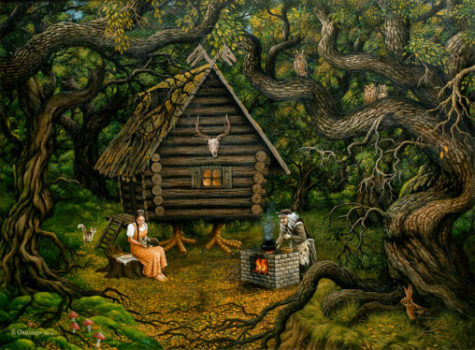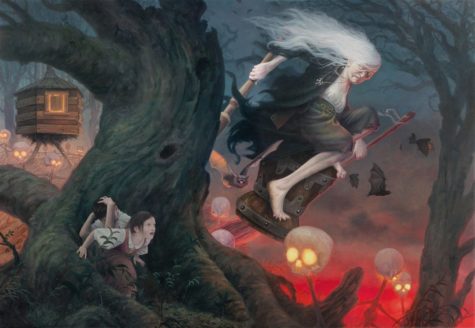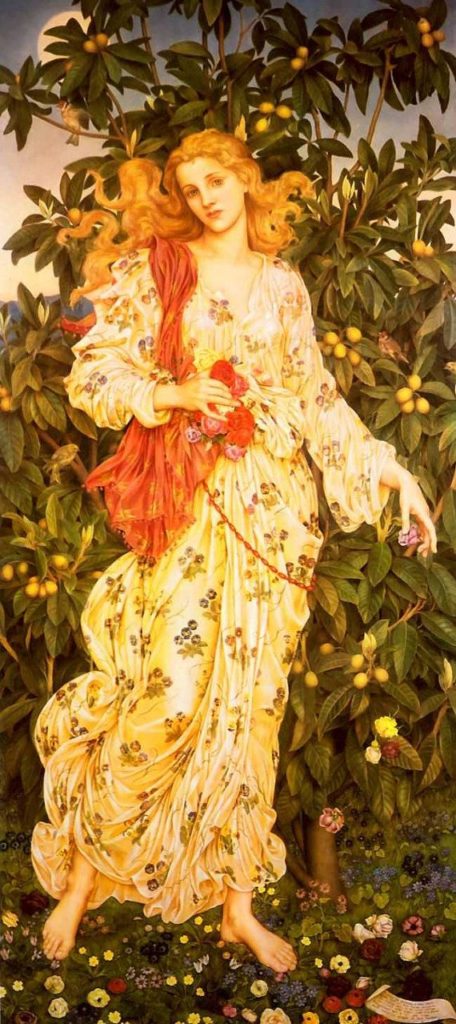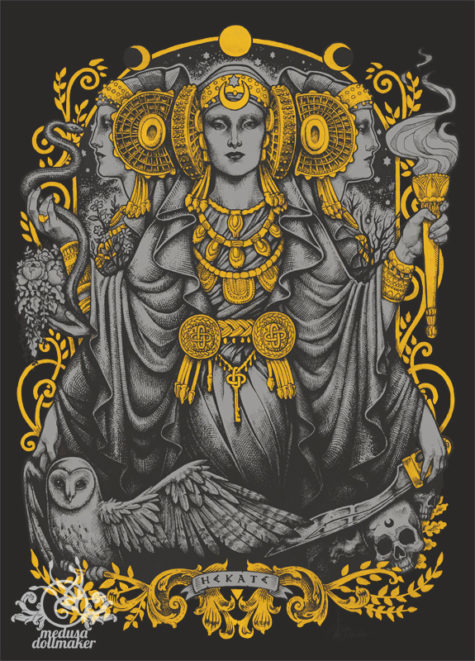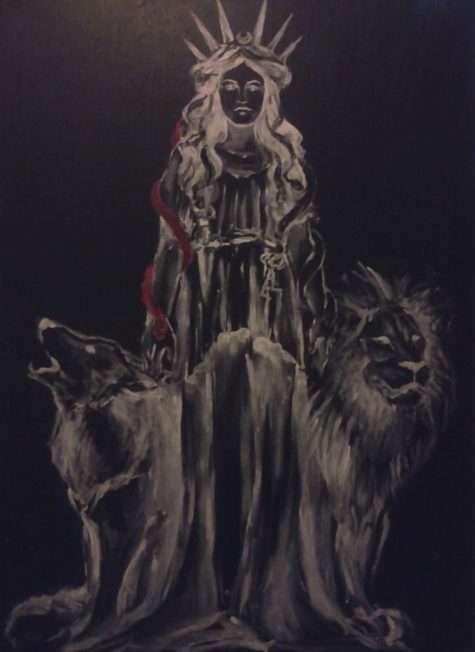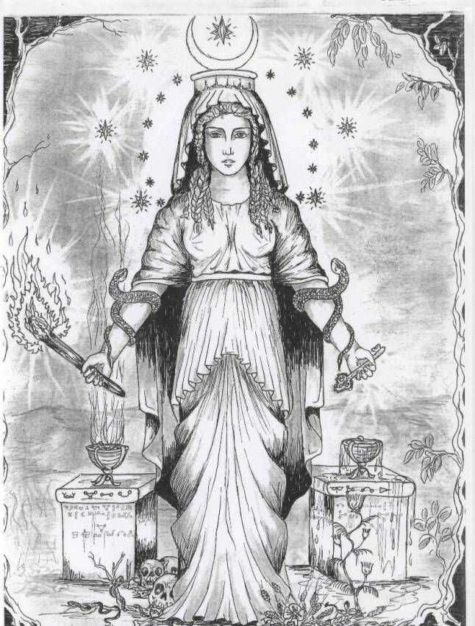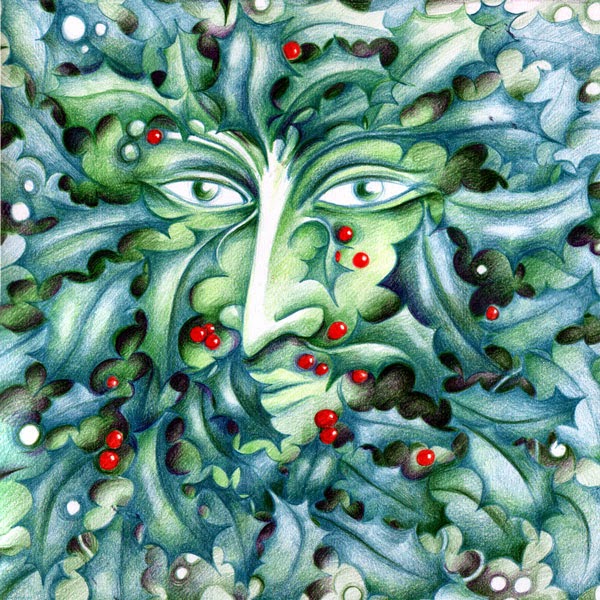Baba Yaga and the Little Girl
Baba Yaga lived deep in the forest and scared passersby to death just by appearing to them. She then devoured Her victims, which is why Her picket fence was topped with skulls. Children’s stories about Baba Yaga tend to be quite similar. Here is a story about a little girl, her wicked stepmother, and Baba Yaga.
Once upon a time there was a man and woman who had an only daughter. When his wife died, the man took another. But the wicked stepmother took a dislike to the girl, beat her hard and wondered how to be rid of her forever. One day the father went off somewhere and the stepmother said to the girl, “Go to your aunt, to my sister, and ask her for a needle and thread to sew you a blouse.” The aunt was really Baba Yaga, the bony witch.
Now, the little girl was not stupid and she first went to her own aunt for advice. “Good morrow. Auntie,” she said. “Mother has sent me to her sister for a needle and thread to sew me a blouse. What should I do?”
The aunt told her what to do. “My dear niece,” she said. “You will find a birch-tree there that will lash your face; you must tie it with a ribbon. You will find gates that will creak and bang; you must pour oil on the hinges. You will find dogs that will try to rip you apart; you must throw them fresh rolls. You will find a cat that will try to scratch your eyes out; you must give her some ham.”
The little girl went off, walked and walked and finally came to the witch’s abode.
There stood a hut, and inside sat Baba Yaga, the bony witch, spinning. “Good day. Auntie,” said the little girl.
“Good day, dearie,” the witch replied.
“Mother sent me for a needle and thread to sew me a blouse,” said the girl.
“Very well,” Baba Yaga said. “Sit down and weave.”
The girl sat at the loom. then Baba Yaga went out and told her serving-maid, “Go and heat up the bath-house and give my niece a good wash; I want to eat her for breakfast.”
The serving-maid did as she was bid; and the poor little girl sat there half dead with fright, begging, “Oh, please, dear serving-maid, don’t bum the wood, pour water on instead, and carry the water in a sieve.” And she gave the maid a kerchief.
Meanwhile Baba Yaga was waiting; she went to the window and asked, “Are you weaving, dear niece? Are you weaving, my dear?”
“I’m weaving, Auntie,” the girl replied, “I’m weaving, my dear.”
When Baba Yaga moved away from the window, the little girl gave some ham to the cat and asked her whether there was any escape. At once the cat replied, “Here is a comb and towel. Take them and run away. Baba Yaga will chase you; put your ear to the ground and, when you hear her coming, throw down the towel?and a wide, wide river will appear. And if she crosses the river and starts to catch you up, put your ear to the ground again and, when you hear her coming close, throw down your comb and a dense forest will appear. She won’t be able to get through that.”
The little girl took the towel and comb and ran. As she ran from the house, the dogs tried to tear her to pieces, but she tossed them the fresh rolls and they let her pass. The gates tried to bang shut, but she poured some oil on the hinges, and they let her through. The birch-tree tried to lash her face, but she tied it with a ribbon, and it let her pass.
In the meantime, the cat sat down at the loom to weave?though, truth to tell, she tangled it all up instead. Now and then Baba Yaga would come to the window and call, “Are you weaving, dear niece? Are you weaving, my dear?” And the cat would answer in a low voice, “I’m weaving. Auntie. I’m weaving, my dear.”
The witch rushed into the hut and saw that the girl was gone. She gave the cat a good beating and scolded her for not scratching out the girl’s eyes. But the cat answered her, “I’ve served you for years, yet you’ve never even given me a bone, but she gave me some ham.”
Baba Yaga then turned on the dogs, the gates, the birch-tree and the serving-maid, and set to thrashing and scolding them all. But the dogs said to her, “We’ve served you for years, yet you’ve never even thrown us a burnt crust, but she gave us fresh rolls.”
And the gates said, “We’ve served you for years, yet you’ve never even poured water on our hinges, but she oiled them for us.”
And the birch-tree said, “I’ve served you for years, yet you’ve never even tied me up with thread, but she tied me with a ribbon.” And the serving-maid said, “I’ve served you for years, yet you’ve never even given me a rag, but she gave me a kerchief.”
From: Russian Fairy Tales
Baba Yaga and the Twins
Somewhere, I cannot tell you exactly where, but certainly in vast Russia, there lived a peasant with his wife and they had twins — a son and daughter. One day the wife died and the husband mourned over her very sincerely for a long time. One year passed, and two years, and even longer. But there is no order in a house without a woman, and a day came when the man thought, “If I marry again possibly it would turn out all right.” And so he did, and had children by his second wife.
The stepmother was envious of the stepson and daughter and began to use them hardly. She scolded them without any reason, sent them away from home as often as she wished, and gave them scarcely enough to eat. Finally she wanted to get rid of them altogether. Do you know what it means to allow a wicked thought to enter one’s heart?
The wicked thought grows all the time like a poisonous plant and slowly kills the good thoughts. A wicked feeling was growing in the stepmother’s heart, and she determined to send the children to the witch, thinking sure enough that they would never return.
“Dear children,” she said to the orphans, “go to my grandmother who lives in the forest in a hut on hen’s feet. You will do everything she wants you to, and she will give you sweet things to eat and you will be happy.”
The orphans started out. But instead of going to the witch, the sister, a bright little girl, took her brother by the hand and ran to their own old, old grandmother and told her all about their going to the forest.
“Oh, my poor darlings!” said the good old grandmother, pitying the children, “my heart aches for you, but it is not in my power to help you. You have to go not to a loving grandmother, but to a wicked witch. Now listen to me, my darlings,” she continued; “I will give you a hint: Be kind and good to every one; do not speak ill words to any one; do not despise helping the weakest, and always hope that for you, too, there will be the needed help.”
The good old grandmother gave the children some delicious fresh milk to drink and to each a big slice of ham. She also gave them some cookies—there are cookies everywhere—and when the children departed she stood looking after them a long, long time.
The obedient children arrived at the forest and, oh, wonder! there stood a hut, and what a curious one! It stood on tiny hen’s feet, and at the top was a rooster’s head. With their shrill, childish voices they called out loud: “Izboushka, Izboushka! turn thy back to the forest and thy front to us!”
The hut did as they commanded. The two orphans looked inside and saw the witch resting there, her head near the threshold, one foot in one corner, the other foot in another corner, and her knees quite close to the ridge pole.
“Fou, Fou, Fou!” exclaimed the witch; “I feel the Russian spirit.”
The children were afraid, and stood close, very close together, but in spite of their fear they said very politely: “Ho, grandmother, our stepmother sent us to thee to serve thee.”
“All right; I am not opposed to keeping you, children. If you satisfy all my wishes I shall reward you; if not, I shall eat you up.”
Without any delay the witch ordered the girl to spin the thread, and the boy, her brother, to carry water in a sieve to fill a big tub. The poor orphan girl wept at her spinning-wheel and wiped away her bitter tears. At once all around her appeared small mice squeaking and saying:
“Sweet girl, do not cry. Give us cookies and we will help thee.”
The little girl willingly did so.
“Now,”gratefully squeaked the mice, “go and find the black cat. He is very hungry; give him a slice of ham and he will help thee.”
The girl speedily went in search of the cat and saw her brother in great distress about the tub, so many times he had filled the sieve, yet the tub was still dry. The little birds passed, flying near by, and chirped to the children:
“Kind-hearted little children, give us some crumbs and we will advise you.”
The orphans gave the birds some crumbs and the grateful birds chirped again: “Some clay and water, children dear!”
Then away they flew through the air.
The children understood the hint, spat in the sieve, plastered it up with clay and rilled the tub in a very short time. Then they both returned to the hut and on the threshold met the black cat. They generously gave him some of the good ham which their good grandmother had given them, petted him and asked: “Dear Kitty-cat, black and pretty, tell us what to do in order to get away from thy mistress, the witch?”
“Well,” very seriously answered the cat, “I will give you a towel and a comb and then you must run away. When you hear the witch running after you, drop the towel behind your back and a large river will appear in place of the towel.
If you hear her once more, throw down the comb and in place of the comb there will appear a dark wood. This wood will protect you from the wicked witch, my mistress.”
Baba Yaga came home just then.
“Is it not wonderful?” she thought; “everything is exactly right.”
“Well,” she said to the children, “today you were brave and smart; let us see to-morrow. Your work will be more difficult and I hope I shall eat you up.”
The poor orphans went to bed, not to a warm bed prepared by loving hands, but on the straw in a cold corner. Nearly scared to death from fear, they lay there, afraid to talk, afraid even to breathe. The next morning the witch ordered all the linen to be woven and a large supply of firewood to be brought from the forest.
The children took the towel and comb and ran away as fast as their feet could possibly carry them. The dogs were after them, but they threw them the cookies that were left; the gates did not open themselves, but the children smoothed them with oil; the birch tree near the path almost scratched their eyes out, but the gentle girl fastened a pretty ribbon to it. So they went farther and farther and ran out of the dark forest into the wide, sunny fields.
The cat sat down by the loom and tore the thread to pieces, doing it with delight. Baba Yaga returned.
“Where are the children?” she shouted, and began to beat the cat. “Why hast thou let them go, thou treacherous cat? Why hast thou not scratched their faces?”
The cat answered: “Well, it was because I have served thee so many years and thou hast never given me a bite, while the dear children gave me some good ham.”
The witch scolded the dogs, the gates, and the birch tree near the path.
“Well,” barked the dogs, “thou certainly art our mistress, but thou hast never done us a favor, and the orphans were kind to us.”
The gates replied: “We were always ready to obey thee, but thou didst neglect us, and the dear children smoothed us with oil.”
“The children ran away as fast as their feet could possibly carry them.”
The birch tree lisped with its leaves, “Thou hast never put a simple thread over my branches and the little darlings adorned them with a pretty ribbon.”
Baba Yaga understood that there was no help and started to follow the children herself. In her great hurry she forgot to look for the towel and the comb, but jumped astride a broom and was off. The children heard her coming and threw the towel behind them. At once a river, wide and blue, appeared and watered the field. Baba Yaga hopped along the shore until she finally found a shallow place and crossed it.
Again the children heard her hurry after them and so they threw down the comb. This time a forest appeared, a dark and dusky forest in which the roots were interwoven, the branches matted together, and the tree-tops touching each other. The witch tried very hard to pass through, but in vain, and so, very, very angry, she returned home.
The orphans rushed to their father, told him all about their great distress, and thus concluded their pitiful story: “Ah, father dear, why dost thou love us less than our brothers and sisters?”
The father was touched and became angry. He sent the wicked stepmother away and lived a new life with his good children. From that time he watched over their happiness and never neglected them any more.
How do I know this story is true? Why, one was there who told me about it.
From:
Folk Tales From the Russian, by Verra Xenophontovna Kalamatiano de Blumenthal, (1903)
Song to Pomona
A silver dew lies on the Autumn grasses,
Autumnal sunshine habits every tree;
From each bejewelled bough there slowly passes
Immeasured scent and sweetness up to thee,
Pomorum Patrona! Pomorum Patrona!
O hear, as thou wert wont to hear of old,
Though guardian goddess of red and gold.
Banners, above thine orchard temples flying.
Flame a new splendour from each glowing glade,
And radiant hills of clustered light are lying
Beneath the lichened pillars on the shade,
Pomorun Patrona! Pomorum Patrona!
O give, as thou wert wont to give of old,
Though guardian goddess of red and gold.
With ample stores abundantly she blesses
Each nesting hamlet of the hills and plains,
Shaking within their thirsty cider-presses
The glory garnered from her woodland fanes.
Pomorun Patrona! Pomorum Patrona!
We praise thy name with voices of young and old,
Though guardian goddess of red and gold.
~ Arthur Rackham
Selenomancy
The lunacy
And the absence of moonlight,
lying here staring at my ceiling
because I can’t see the sky.
By the dim light of my little leaning
tower of pisa lamp-a tiny plastic architectural wonder,
with its small switch so old and functional-
I didn’t see it coming.
It’s the lunacy
that keeps me wondering how you are,
if you are seeing that moon again tonight, the same one
in the backyard
with the feathery tips of evergreens jabbing into it.
How crazy it was to have spied it together,
when things weren’t so strained.
I think you have me staring at this ceiling
while you stare at the moon.
I think you have lunacy, too.
I want to tell you about a lunatic’s sweetness,
galvanized by her belief that somehow
all this isn’t her fault.
~Janelle Farvour
The Hour of the Dark Moon
The hour of the dark moon draws near;
I hear the invoking words,
hear and appear
Chthonia, Enodia, Trioditis
I come unto the holy bliss.
Prayer To Selene For Any Operation
O three-faced Selene, come to me beloved mistress
Graciously hear my sacred spells;
Image of Night, Youthful One,
Dawn-born, light-bringer to mortals
Who rides upon fierce-eyed bulls.
O Queen, you who drive your chariot
On equal course with Helios,
You dance with the triple forms of the triple Graces
As you revel with the stars.
You are Justice and the thread of the Fates,
Clotho, Lachesis and Atropos,
O Three-headed One you are
Persephone, Megaira and Allecto
O One of many shapes who arm your hands
With terrible dark-glowing lamps,
Who shakes locks of fearsome serpents at your brow,
Whose mouths send forth the roar of bulls,
Whose womb is thick with reptile scales,
At whose shoulders are rows of venomous serpents,
Bound across your back beneath murderous chains.
O Night-bellower, Lover of solitude,
Bull-faced and Bull-headed One
You have the eyes of bulls and the voice of dogs.
Your forms are hidden in the legs of lions.
Your ankle is wolf-shaped,
and savage dogs are friendly to you,
Wherefore they call you Hekate, Many-named, Mene,
Cleaving the air like arrow-shooting Artemis,
O Goddess of Four faces, Four names, Four ways,
Artemis, Persephone, Deer-shooter, Night-shiner,
Thrice-resounding, Triple voiced, Three-headed, Thrice-named Selene
O Trident-bearing One of Three faces,
Three necks, Three Ways,
Who holds undying flaming fire in triple baskets.
You frequent the Three Ways
and are Mistress of the Three Decads.
Be gracious unto me who is invoking you
and hearken favourably.
You encompass the vast world at night,
You make the Daemones shudder
and the Immortals tremble,
O Many-named Goddess who brings glory to men,
Whose children are fair, O Bull-eyed One, Horned One,
Nature, All-mother, who brings forth both Gods and men,
You roam around Olympus and traverse
the wide and fathomless Abyss,
You are the Beginning and End,
and you alone are Mistress of All:
For from you are All things, and in you,
Eternal One, do All things end.
You bear at your brow an everlasting diadem,
The unbreakable and irremovable bonds of great Cronos,
And you hold in your hands a golden sceptre
Which is encircled by a formula
inscribed by Cronos himself
Who gave it to you to bear in
order that all things remain steadfast:
‘Overpowerer and Overpowered One
Conqueror of men and Damnodamia,’
You rule Chaos, Araracharara ephthisikere,
Hail Goddess and attend your epithets,
I offer you this incense Child of Zeus
Arrow-shooter, Heavenly One, Goddess of Harbours,
Mountain-roamer, Goddess of Crossroads,
Nocturnal One of the Underworld, Shadowy One of Hades,
Still One who frightens, having a feast among the graves.
You are Night, Darkness and broad Chaos,
For you are Necessity hard to escape
You are Fate, you are Erinys and the Torture,
You are the Murderess and Justice
You hold Cerberus in Chains,
You are steely-blue with serpent-scales,
O serpent-haired and Serpent-girdled One,
Blood-drinker, Death-bringer who breeds corruption,
Feaster on hearts,
Flesh-eater who devours those who died before their time,
Grave-resounder,
Driver to the Wanderings of Madness,
Come to my sacrifices and fulfil this task for me.
~From the Greek Magical Papyri
~And also: Hekate Liminal Rites
Note:
This hymn from the Greek Magical Papyri, is addressed to Selene even though it is clearly a hymn to Hekate. The confusion of title probably arose from the syncretisation of the goddesses in the hymn, with Selene being mentioned first.
It is an awesome invocation, and perfect for use on any of Hekate’s Feast Days.
The invocation is meant to be accompanied by an offering. In keeping with other contemporary magickal practices, fragrant resins and herbs are used for positive magick. Incenses such as storax, myrrh, sage, frankincense, and (surprisingly) a fruit pit are recommended.
When calling up such a powerful and terrible deity, it’s always a good idea to bring protective charms, generous offerings, and a spirit of deep respect and reverence.
Ode to Hekate
Light My Path
Prayer to Hekate
Sacred flame rise to power
We ask Hekate to help us empower
Hear us tonight as we request
to the needs we have to be addressed
Our prayer to you is that our needs to be met
enough money and food shelter that we won’t regret
Health and well being take care of what is not seen
Keep our spirits white and clean
We ask the universe to lend us the power
to come to this circle in this hour
We draw to ourselves the request we desire
asking it harm none and let it transpire.
This spell is done on this new moon night
We know that everything will be alright
No way can this spell be reversed
no negativity no curse.
So Mote It Be!
source: The Gay Mage
Invocation To The Dark Mother
“We call to thee,
Ama,
dark Mother;
thou to whom all manifested life must return,
when its time has come;
dark Mother of stillness and rest,
before whom men tremble because they understand thee not.
We call to thee,
who art also Hecate of the waning Moon,
dark Lady of wisdom,
whom men fear because they wisdom towers above their own.
We, the hidden children of the Goddess,
know that there is naught to fear in thine embrace,
which none escape;
that when we step into the darkness,
as all must,
it is but to step again into the light.”
~J and S Farrar
Worth Exploring
James Cheney: Invocation To The Dark Mother
Daniel: Prayer Before The Final Battle
blessed obyno: Queen of Ghosts
blessed obyno: Queen of Ghosts
Caerlion Arthur: The Great, Bloody and Bruised Veil of the World
